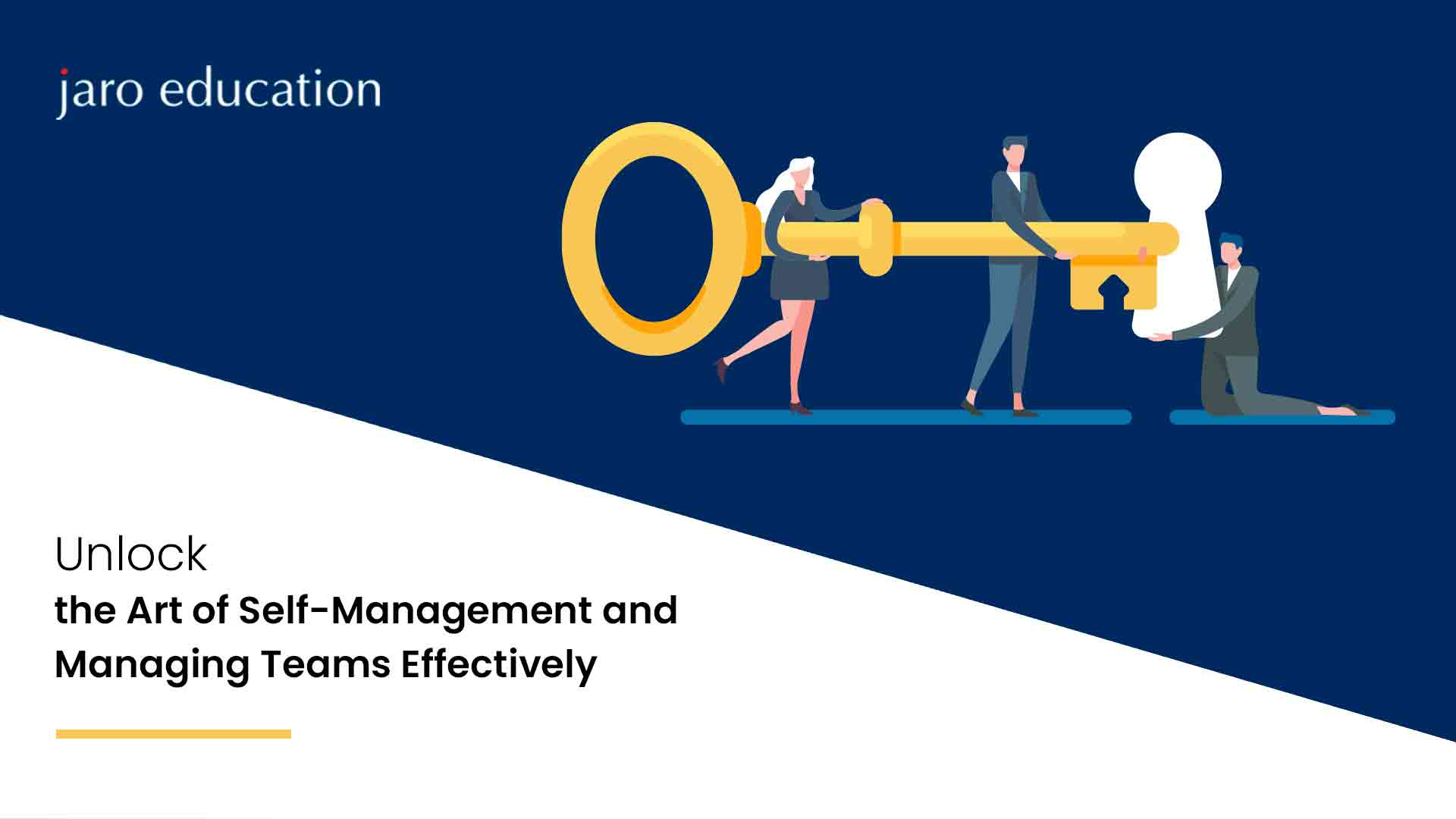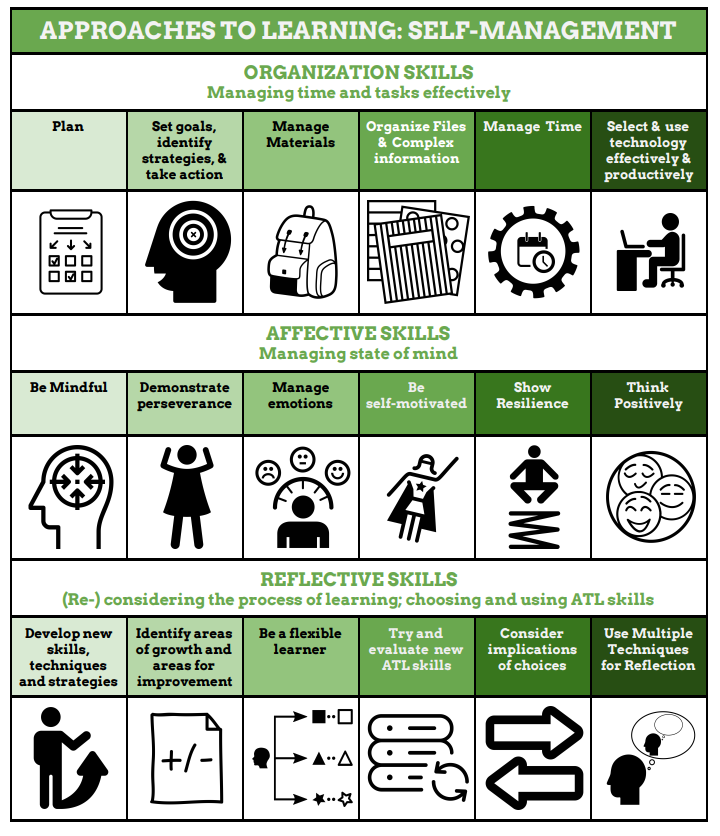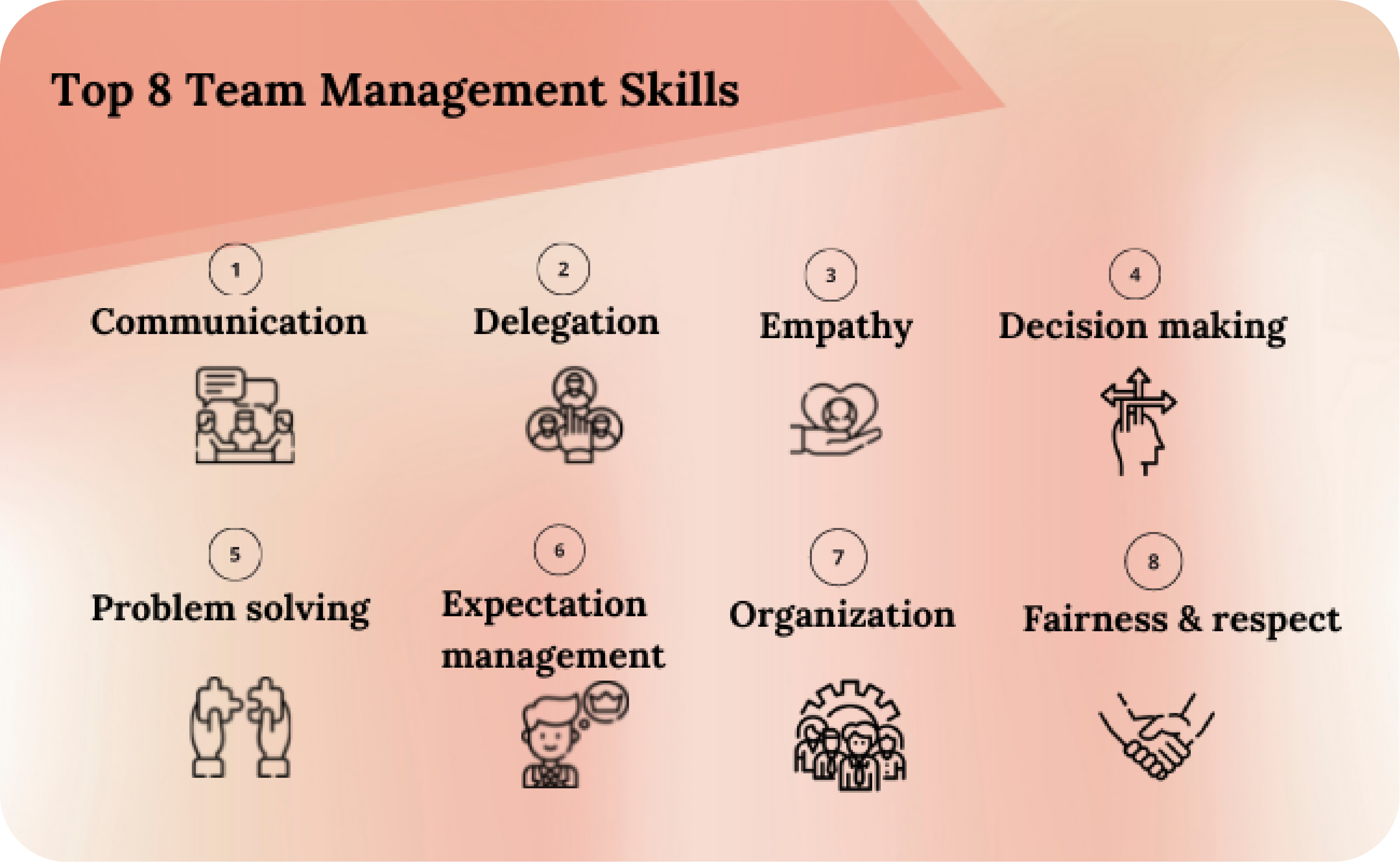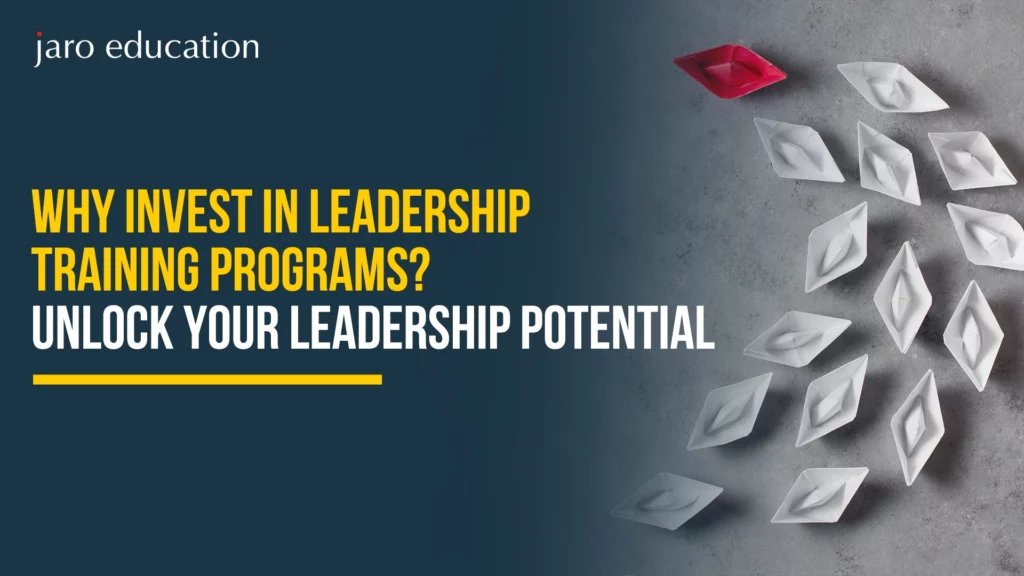Unlock the Art of Self-Management and Managing Teams Effectively
Table of Contents

- jaro education
- 15, October 2024
- 5:00 pm
In the modern business landscape, where agility, innovation, and productivity reign supreme, leaders face growing pressure to not only manage themselves but also inspire, motivate, and guide teams towards success. To rise above these challenges, unlocking the art of self-management and team management becomes essential.
How can professionals master these critical skills while climbing the leadership ladder? The answer lies in investing in holistic management education, like the Post Graduate Certificate Programme in General Management from IIM Nagpur. This programme equips professionals with the strategic, analytical, and leadership skills required to excel in today’s demanding corporate world.
The Importance of Self-Management in Leadership
Self-management is the cornerstone of effective leadership. Before you can lead others, you need to manage yourself—your time, emotions, energy, and goals. A leader who cannot self-regulate will struggle to gain the trust and respect of their team. But what exactly is self-management? What are the essential self-management skills?
| Key Aspects of Self-Management | Description |
|---|---|
| Time Management | Efficiently organising tasks and priorities to maximise productivity. |
| Emotional Regulation | Maintaining composure and emotional balance, even in high-pressure situations. |
| Goal Setting & Alignment | Defining clear, actionable goals aligned with both personal and organisational objectives. |
| Self-Motivation | Continuously pushing yourself to achieve, without external prompts or pressure. |
| Adaptability | The ability to adjust to changing circumstances while remaining focused. |
Key Techniques for Effective Self-Management
Here are a few strategies to enhance self-management:
- Develop Emotional Intelligence: Self-management goes hand in hand with emotional intelligence. Build self-awareness and empathy, which help in managing not only yourself but also in leading teams with understanding and care.
- Prioritise Your Tasks: Use methods like the Eisenhower Matrix to determine which tasks are urgent and important, enabling you to focus on high-impact activities.
- Create Routine and Discipline: Habits and structure lead to consistency in performance. Whether it’s through daily planning or time-blocking, discipline is key.
- Stay Resilient Under Pressure: Cultivate resilience by adopting a growth mindset, learning from failures, and staying solution-focused.

*LibGuides
Mastering Team Management: The Next Level of Leadership
Once you have mastered the art of managing yourself, the next step is leading others effectively. Managing a team requires understanding group dynamics, building trust, and aligning collective efforts towards a common goal.
| Key Elements of Team Management | Description |
|---|---|
| Clear Communication | Ensuring that all team members are on the same page regarding tasks and objectives. |
| Empowerment & Delegation | Trusting your team to take ownership of tasks, which fosters independence and growth. |
| Conflict Resolution | Addressing disagreements in a constructive manner, ensuring team harmony. |
| Performance Monitoring | Tracking progress and providing feedback to ensure goals are met efficiently. |
| Motivation & Engagement | Keeping the team inspired and engaged through recognition, rewards, and a positive work environment. |
How to Manage Teams Effectively
Effective team management involves a set of core practices that help leaders bring out the best in their team members:
- Set Clear Goals: Teams perform better when they know exactly what they are working towards. Aligning personal and team goals with the organisation’s vision is crucial.
- Foster Open Communication: Encourage regular check-ins, feedback sessions, and open channels for communication. This helps in solving problems quickly and maintaining transparency.
- Encourage Innovation and Creativity: A team that feels safe to express new ideas is more likely to come up with innovative solutions to challenges.
- Balance Leadership and Empathy: While a leader should be decisive, they must also show understanding and empathy for their team’s challenges, ensuring a supportive work environment.
- Celebrate Successes and Learn from Failures: Recognising accomplishments boosts morale, while learning from setbacks fosters continuous improvement.

*SuperBeings
Why IIM Nagpur’s General Management Programme?
To truly master the nuances of self-management and team leadership, you need a structured approach to learning. This is where the Post Graduate Certificate Programme in General Management (PGCPGM) from IIM Nagpur comes into play. This programme is specifically designed for professionals looking to step up into managerial and leadership roles.
With a structured 12-month hybrid learning model, participants can upskill while balancing work commitments. Here’s an expanded overview of the programme’s key elements:
Comprehensive Curriculum for Leadership Development
The curriculum covers a broad spectrum of managerial topics, including leadership, strategy, team management, and self-leadership. The programme not only focuses on academic excellence but also emphasizes the practical application of knowledge. Real-world case studies, simulations like Digital Markstrat, and projects allow participants to navigate and solve business challenges effectively.
Flexible, Professional-Friendly Learning
With classes scheduled on Sundays from 2:00 PM to 5:00 PM, this programme is designed for working professionals. The hybrid mode, combining online sessions with a three-day campus immersion, ensures participants engage with IIM Nagpur faculty and peers in both digital and in-person settings.
World-Class Faculty and Pedagogy
Participants will benefit from the guidance of esteemed faculty members. IIM Nagpur’s focus on industry-led pedagogy ensures that professionals gain insights into cutting-edge management practices, making this an opportunity to learn from experts who bridge academia and industry.
Executive Alumni Status and Career Growth
On completion, participants receive a prestigious Certificate of Completion from IIM Nagpur, along with Executive Alumni Status—a credential that can open doors to further career advancement. The mix of rigorous learning hours and immersion in real-world business scenarios makes the PGCPGM an ideal stepping stone toward leadership.
Programme Fee Structure
| Fee Component | Amount | Due Date |
|---|---|---|
| Application Fee | INR 2,360/- | At the time of application |
| Programme Fee | INR 2,55,000/- + GST | Payable in installments |
| Instalment I | INR 85,000/- + GST | 7th November, 2024 |
| Instalment II | INR 85,000/- + GST | 15th February, 2025 |
| Instalment III | INR 85,000/- + GST | 15th May, 2025 |
| EMI Options | Available | For flexible payment |
Eligibility Criteria
| Criteria | Details |
|---|---|
| Educational Qualification | Diploma (10+2+3), Bachelor’s Degree (10+2+3 or 10+2+4), or 2-Year Master’s Degree from a recognized university (UGC/AICTE/DEC/AIU/State Government) in any discipline |
| Work Experience | Minimum 2 years of experience after completion of qualifying education |
This detailed structure ensures transparency and provides professionals with an easy payment plan while outlining clear eligibility criteria for applicants.
Here’s how the programme can help:
| Feature | Benefit |
|---|---|
| Comprehensive Curriculum | Covers everything from leadership, strategy, and decision-making to team management and self-leadership. |
| Case-Based Learning | Learn from real-world case studies, ensuring you apply theory to practice in a business context. |
| Focus on Leadership Development | Gain insights into your personal leadership style and how to improve your team management skills. |
| Expert Faculty | Learn from some of the best minds in business education, ensuring you receive top-tier knowledge. |
| Flexible Learning | The programme is designed for working professionals, offering flexible scheduling options. |
Conclusion: Leadership is an Art – Master It with IIM Nagpur
Mastering self-management and managing teams effectively are non-negotiable skills for anyone aiming to succeed in leadership roles. Whether it’s building emotional intelligence through self-management, aligning your personal goals with professional aspirations, or leading teams to success, these skills define the leaders of tomorrow.
The journey to becoming a well-rounded leader begins with the right education. Enrolling in IIM Nagpur’s Post Graduate Certificate Programme in General Management, with Jaro Education as a strategic marketing and technology partner, will give you the foundation and advanced strategies you need to excel.
Take control of your leadership path today—learn to manage yourself, inspire your team, and unlock new professional heights!
Frequently Asked Questions
Self-management is demonstrated through the ability to take responsibility for your actions, emotions, and work without external supervision. Key ways to show self-management include:
-
- Time Management: Effectively prioritising tasks and meeting deadlines.
- Emotional Regulation: Staying calm under pressure and managing stress positively.
- Goal-Setting: Creating clear personal and professional goals and systematically working towards them.
- Accountability: Taking ownership of successes and setbacks and learning from mistakes.
- Adaptability: Being flexible and open to change, while maintaining focus on long-term goals.
A self-management approach involves taking control of one’s behaviours, emotions, and actions to achieve personal and professional goals. It focuses on:
-
- Self-Awareness: Understanding your strengths, weaknesses, and triggers.
- Proactive Planning: Setting goals, anticipating challenges, and developing strategies to overcome obstacles.
- Continuous Improvement: Regular self-assessment to identify areas for personal development and performance enhancement.
- Empowerment: Taking initiative and leading your own development, rather than relying on external direction or motivation.
Self-management is essential for both personal success and professional effectiveness. Its usefulness can be seen in several ways:
-
-
- Improved Decision-Making: Self-management helps you think more clearly and make better decisions, especially under pressure.
- Enhanced Leadership: Strong self-management is a key trait of effective leaders, enabling you to lead by example.
- Greater Job Satisfaction: By taking control of your work, you can reduce stress and increase satisfaction.
- Career Growth: Mastering self-management makes you more efficient, reliable, and capable, positioning you for career advancement.
- Resilience: It equips you to bounce back from setbacks and adapt to challenges with a positive mindset.
-
Self-management is a skill that, when mastered, can unlock new levels of personal and professional achievement.








